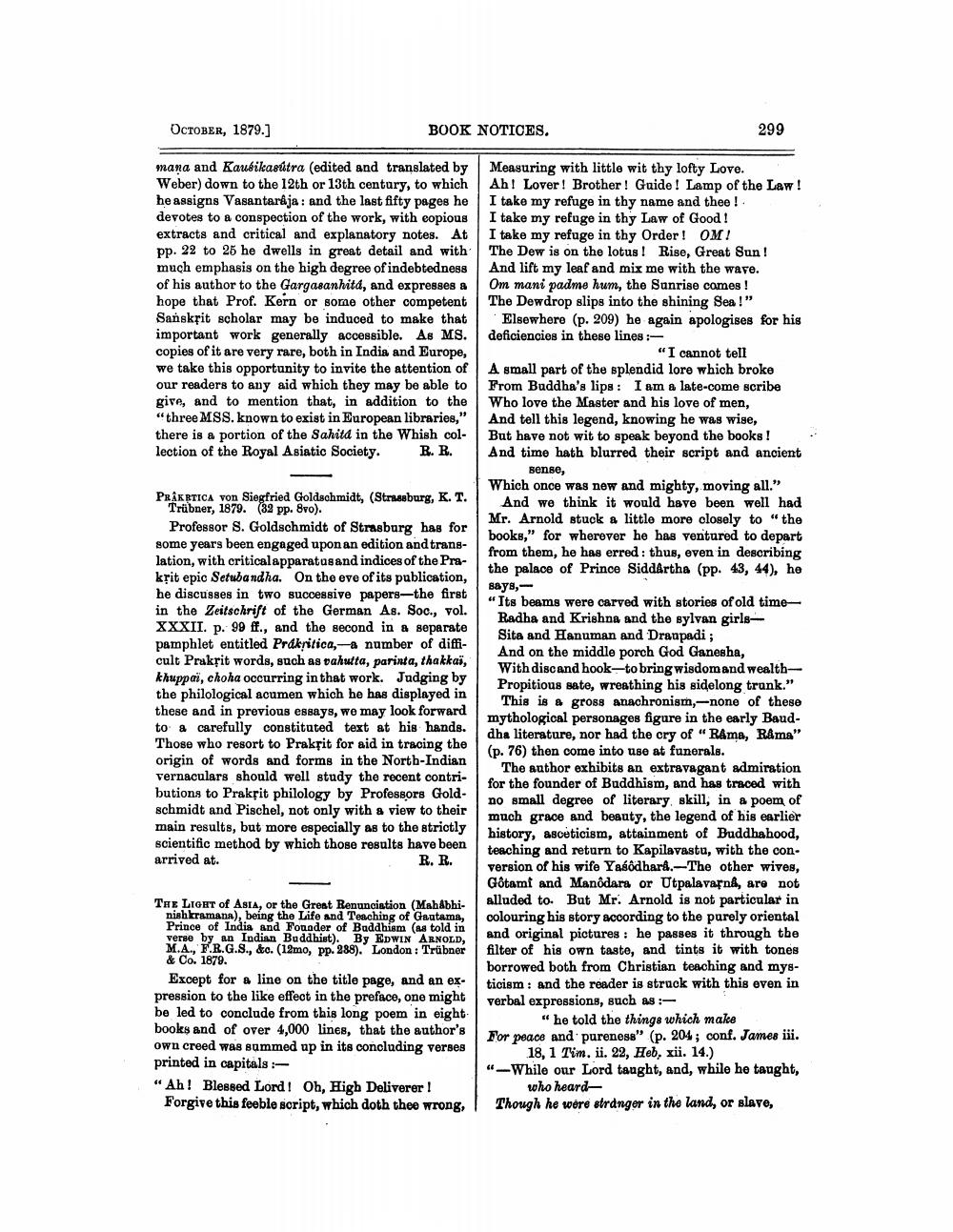________________
OCTOBER, 1879.]
BOOK NOTICES.
299
mana and Kaubikasitra (edited and translated by Weber) down to the 12th or 13th century, to which he assigns Vasantaraja : and the last fifty pages he devotes to a conspection of the work, with copious extracts and critical and explanatory notes. At pp. 22 to 25 he dwells in great detail and with much emphasis on the high degree of indebtedness of his author to the Gargasanhita, and expresses a hope that Prof. Kern or some other competent Sanskrit scholar may be induced to make that important work generally accessible. As MS. copies of it are very rare, both in India and Europe, we take this opportunity to invite the attention of our readers to any aid which they may be able to give, and to mention that, in addition to the “three MSS. known to exist in European libraries," there is a portion of the Sahitd in the Whish col. lection of the Royal Asiatic Society. E. R.
PRAKRTICA von Siegfried Goldschmidt, (Strassburg, K. T.
Trübner, 1879. (32 pp. 8vo).
Professor S. Goldschmidt of Strasburg has for some years been engaged upon an edition and translation, with criticalapparatus and indices of the Prekrit epic Setubandha. On the eve of its publication, he discusses in two successive papers-the first in the Zeitschrift of the German As. Soc., vol. XXXII. p. 99 ff., and the second in a separate pamphlet entitled Prakritica,-a number of difficult Prakrit words, such as vahutta, parinta, thakkač, khuppai, choha occurring in that work. Judging by the philological acumen which he has displayed in these and in previous essays, we may look forward to a carefully constituted text at his hands. Those who resort to Prakpit for aid in tracing the origin of words and forms in the North-Indian vernaculars should well study the recent contributions to Prakrit philology by Professors Goldschmidt and Pischel, not only with a view to their main results, but more especially as to the strictly scientific method by which those results have been arrived at.
R.R.
Measuring with little wit thy lofty Love. Ah! Lover! Brother! Guide! Lamp of the Law ! I take my refuge in thy name and thee!. I take my refuge in thy Law of Good! I take my refuge in thy Order! OM! The Dew is on the lotus ! Rise, Great Sun! And lift my leaf and mix me with the wave. Om mani padme hum, the Sunrise comes ! The Dewdrop slips into the shining Sea!"
Elsewhere (p. 209) he again apologises for his deficiencies in these lines :
"I cannot tell A small part of the splendid loro which broke From Buddha's lips: I am a late-come scribe Who love the Master and his love of men, And tell this legend, knowing he was wise, But have not wit to speak beyond the books! And time hath blurred their script and ancient
Bense, Which once was new and mighty, moving all."
And we think it would have been well had Mr. Arnold stuck a little more closely to "the books," for wherever he has ventured to depart from them, he has erred: thus, even in describing the palace of Prince Siddartha (pp. 43, 44), ho says, "Its beams were carved with stories of old time
Radha and Krishna and the sylvan girlsSita and Hanuman and Draupadi; And on the middle porch God Ganesha, With discand hook-to bring wisdomand wealthPropitious sate, wreathing his sidelong trunk."
This is a gross anachronism,-none of these mythological personages figure in the early Bauddha literature, nor had the cry of “Rama, Rama" (p. 76) then come into use at funerals.
The author exhibits an extravagant admiration for the founder of Buddhism, and has traced with no small degree of literary, skill, in a poem of much grace and beauty, the legend of his earlier history, asceticism, attainment of Buddhahood, teaching and return to Kapilavastu, with the conversion of his wife Yasodhari. - The other wives, Gôtamt and Manôdara or Utpalavafns, are not alluded to. But Mr. Arnold is not particular in colouring his story according to the purely oriental and original pictures : he passes it through the filter of his own taste, and tints it with tones borrowed both from Christian teaching and mysticism: and the reader is struck with this even in verbal expressions, such as :
" he told the things which make For peace and pureness" (p. 204; conf. James iii.
18,1 Tim. ii. 22, Heb, xii. 14.) "-While our Lord taught, and, while he taught,
who heardThough he were stranger in the land, or slavo,
THE LIGHT of Asia, or the Great Renunciation (Mahabhi
nish ramana), being the Life and Teaching of Gautama, Prince of India and Fonader of Buddhism (as told in verse by an Indian Buddhist). By EDWIN ARNOLD, M.A., F.R.G.S., &c. (12mo, pp. 288). London: Trübner & Co. 1879.
Except for a line on the title page, and an ex. pression to the like effect in the preface, one might be led to conclude from this long poem in eightbooks and of over 4,000 lines, that the author's own creed was summed up in its concluding verses printed in capitals :"Ah! Blessed Lord! Oh, High Deliverer!
Forgive this feeble script, which doth thee wrong,




